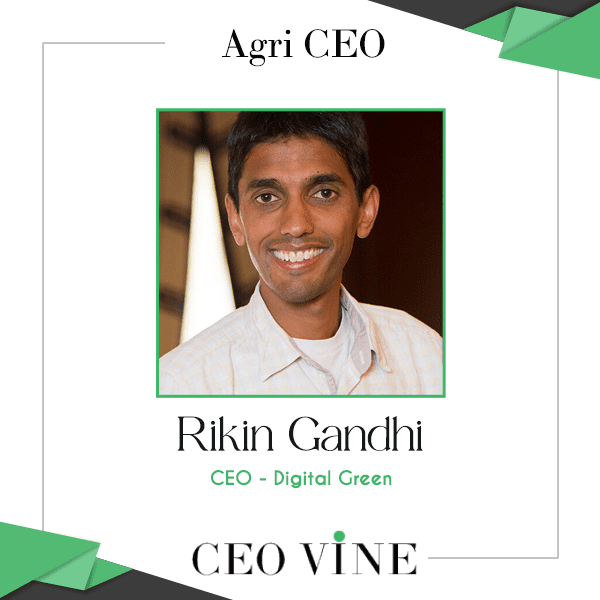Rikin Gandhi is the president and CEO of Digital Green. Rikin’s interests include sustainable agriculture and socioeconomic development technology. He co-founded Digital Green as a research project in Microsoft Research India’s Technology for Emerging Markets team, and he now leads a Digital Green spin-off that works to increase the effectiveness of agricultural development around the world.
Rikin was born and raised in the United States. He is a private pilot with a license and has received patents for linguistic search algorithms that he helped develop at Oracle. He holds a master’s degree in aeronautical and astronautical engineering from MIT and a bachelor’s degree in computer science from Carnegie Mellon University.
Rikin’s time in India’s rural communities changed his life. He developed a strong desire to assist the country’s rural farmers, whom he regarded as heroes. Rikin’s passion has become his career more than a decade later; in 2006, he co-founded what is now Digital Green.
Under Rikin’s direction, Digital Green created a one-of-a-kind model for disseminating agricultural information via low-cost videos created by and for small-scale farmers. The organization collaborated with local non-governmental organisations and government agencies to train farmers in video production and dissemination, as well as to establish networks of peer-to-peer learning and knowledge sharing.
Over the years, Digital Green’s reach and impact have grown, with the organization now working in over 20 countries across Africa, Asia, and Latin America, reaching over 1.5 million farmers. A variety of donors and partners, including the Bill and Melinda Gates Foundation, USAID, and the World Bank, have also recognised and supported the organization.
Rikin Gandhi, a 31-year-old Indian-American who had never visited an Indian village before 2006, is now leading a pan-India movement called Digital Green, in which farmers in 2,000 villages film videos of the best seeding and farming practices they use and show them to their fellow villagers every two weeks.
How does Digital Green work? By Rikin Gandhi
We collaborate with various NGOs and government departments in various states to train four to six farmers in each district to become community filmmakers.
We train a few farmers from each district to create and show short videos in which they record their problems, share solutions, and highlight success stories. They are given handheld, battery-powered cameras to shoot with and handheld pico projectors to show the videos to small groups of people in remote villages without electricity.
The team’s job is to ensure that each film is technically sound. We already have a library of 2,600 videos, which are being shown to farmers in seven states. In general, our collaborating NGOs or concerned government departments follow up to see if a film that was shown in a village, say, a month ago, resulted in the desired changes in their lives.
Rikin Gandhi has remained committed to Digital Green’s mission of empowering small-scale farmers and rural communities through technology and partnerships throughout his tenure as CEO. He has also been an outspoken supporter of the role of technology in promoting sustainable agriculture and addressing global issues such as food security and climate change.







